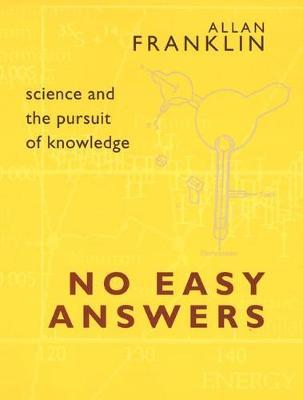Overview
Allan Franklin offers an accurate picture of science to both a general reader and to scholars in the humanities and social sciences who may not have any background in physics. Through the examination of nontechnical case studies, he illustrates the various roles that experiment plays in science. He uses examples of unquestioned success, such as the discoveries of the electron and of three types of neutrino, as well as studies that were dead ends, wrong turns, or just plain mistakes, such as the fifth force, a proposed modification of Newton's law of gravity. Franklin argues that science is a reasonable enterprise that provides us with knowledge of the natural world based on valid experimental evidence and reasoned and critical discussion, and he makes clear that it behooves all of us to understand how it works.
Full Product Details
Author: Allan Franklin
Publisher: University of Pittsburgh Press
Imprint: University of Pittsburgh Press
Dimensions:
Width: 15.20cm
, Height: 2.20cm
, Length: 22.90cm
Weight: 0.531kg
ISBN: 9780822942504
ISBN 10: 082294250
Pages: 272
Publication Date: 31 March 2005
Audience:
General/trade
,
College/higher education
,
General
,
Undergraduate
Format: Hardback
Publisher's Status: Out of Print
Availability: Out of stock

Reviews
Franklin successfully demonstrates how experimental work supports and corrects scientific knowledge, making science 'a reasonable enterprise that gives us knowledge of the natural world, based on valid experimental evidence and on a reasoned and critical discussion.' Highly recommended. --Choice Readers not familiar with the literature will learn through Franklin's book a great deal about the history of the electron, the neutrino, the magnetic monopole, and much else. [He] wisely selects his case studies to illuminate the influence that experiments have had in science . . . physicists will find in it a useful epitome of Franklin's past contributions and will be reassured of the legitimacy of their rationalist conception of science. --Physics Today Franklin's superb contributions to the history and philosophy of science over many years have provided the foundation for this excellent book, in which he makes the inner workings of science accessible to a broad audience of well-educated nonscientists. By examining wrong experiments as well as correct ones, he shows how scientists make rational arguments and follow reasonable strategies to sort out competing claims. In the process, he answers some of the most serious critics of science. --History of Physics Newsletter Franklin s superb contributions to the history and philosophy of science over many years have provided the foundation for this excellent book, in which he makes the inner workings of science accessible to a broad audience of well-educated nonscientists. By examining wrong experiments as well as correct ones, he shows how scientists make rational arguments and follow reasonable strategies to sort out competing claims. In the process, he answers some of the most serious critics of science. --History of Physics Newsletter Franklin successfully demonstrates how experimental work supports and corrects scientific knowledge, making science 'a reasonable enterprise that gives us knowledge of the natural world, based on valid experimental evidence and on a reasoned and critical discussion.' Highly recommended. --Choice Readers not familiar with the literature will learn through Franklin's book a great deal about the history of the electron, the neutrino, the magnetic monopole, and much else. [He] wisely selects his case studies to illuminate the influence that experiments have had in science . . . physicists will find in it a useful epitome of Franklin's past contributions and will be reassured of the legitimacy of their rationalist conception of science. --Physics Today
Franklin's superb contributions to the history and philosophy of science over many years have provided the foundation for this excellent book, in which he makes the inner workings of science accessible to a broad audience of well-educated nonscientists. By examining wrong experiments as well as correct ones, he shows how scientists make rational arguments and follow reasonable strategies to sort out competing claims. In the process, he answers some of the most serious critics of science. --History of Physics Newsletter
Author Information
Allan Franklin, professor of physics at the University of Colorado, Boulder, is author of Selectivity and Discord: Two Problems of Experiment; Are There Really Neutrinos? An Evidential History; Can That Be Right? Essays on Experiment, Evidence, and Science; Experiment, Right or Wrong; and other books.



